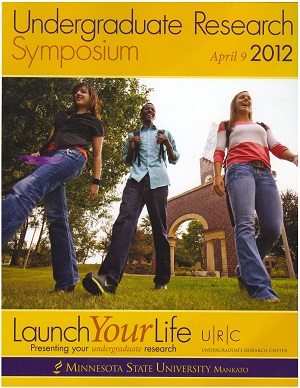In One Ear and Out the Other: The Correction of Psychology Misconceptions and Our Minds Resistance to it
Location
CSU Ballroom
Start Date
9-4-2012 1:00 PM
End Date
9-4-2012 2:30 PM
Student's Major
Psychology
Student's College
Social and Behavioral Sciences
Mentor's Name
Karla Lassonde
Mentor's Department
Psychology
Mentor's College
Social and Behavioral Sciences
Description
We are constantly being overwhelmed with information through media. While this has heralded a new era of research and advancement, the information we learn isn’t always correct. Knowledge permeates the general population, and students often apply learned general misconceptions to their field of study. In previous studies, we assessed psychology students’ knowledge of 50 misconceptions. Students with more experience in the major correctly identified misconceptions as “false” compared to introductory psychology students, but still held many to be true. The goal of the current study was to evaluate the effectiveness of a method of knowledge revision for misconceptions. Misconceptions were elaborated upon in a series of 24 texts and in each text a misconception was either directly stated as incorrect or not. The time it took participants to read outcome sentences containing refutation information, or only description information and no refutation, was recorded. Participants took longer to read outcome sentences following passages that didn’t contain a refutation compared to those that did. Thus, the refutation texts served to compete with prior knowledge about the misconception in memory and readers had less trouble processing the outcome sentence when it was contradictory to the misconception. Additionally, participants took a pre-test assessing their knowledge for the misconceptions before reading and a post- test after reading the passages. When the assessments were compared, the average difference in score was 10.57, suggesting a positive influence of the refutation texts on knowledge. These findings can be applied and used to inform learning in the classroom.
In One Ear and Out the Other: The Correction of Psychology Misconceptions and Our Minds Resistance to it
CSU Ballroom
We are constantly being overwhelmed with information through media. While this has heralded a new era of research and advancement, the information we learn isn’t always correct. Knowledge permeates the general population, and students often apply learned general misconceptions to their field of study. In previous studies, we assessed psychology students’ knowledge of 50 misconceptions. Students with more experience in the major correctly identified misconceptions as “false” compared to introductory psychology students, but still held many to be true. The goal of the current study was to evaluate the effectiveness of a method of knowledge revision for misconceptions. Misconceptions were elaborated upon in a series of 24 texts and in each text a misconception was either directly stated as incorrect or not. The time it took participants to read outcome sentences containing refutation information, or only description information and no refutation, was recorded. Participants took longer to read outcome sentences following passages that didn’t contain a refutation compared to those that did. Thus, the refutation texts served to compete with prior knowledge about the misconception in memory and readers had less trouble processing the outcome sentence when it was contradictory to the misconception. Additionally, participants took a pre-test assessing their knowledge for the misconceptions before reading and a post- test after reading the passages. When the assessments were compared, the average difference in score was 10.57, suggesting a positive influence of the refutation texts on knowledge. These findings can be applied and used to inform learning in the classroom.
Recommended Citation
Erickson, Samuel; Samantha Bergmann; and Sarah Lewer. "In One Ear and Out the Other: The Correction of Psychology Misconceptions and Our Minds Resistance to it." Undergraduate Research Symposium, Mankato, MN, April 9, 2012.
https://cornerstone.lib.mnsu.edu/urs/2012/poster-session-B/43




